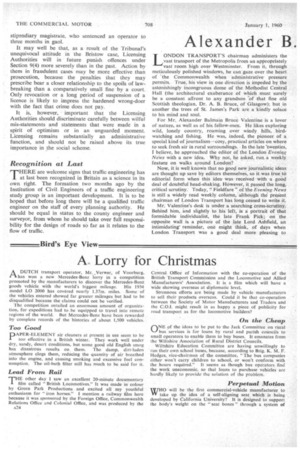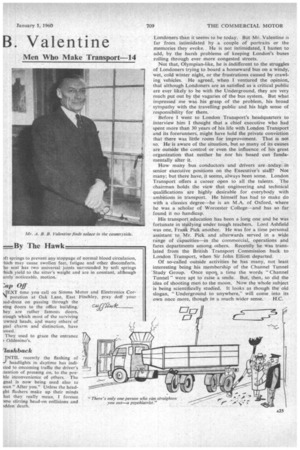Alexander B.
Page 26

Page 27

If you've noticed an error in this article please click here to report it so we can fix it.
B. Valentine LONDON TRANSPORT'S chairman administers the vast transport of the Metropolis from an appropriately vast room high over Westminster. From it, through meticulously polished windows, he can gaze over the heart of the Commonwealth when administrative pressure permits. True, his view in one direction is impeded by the astonishingly incongruous dome of the Methodist Central Hall (the architectural exuberance of which must surely be a constant affront to any grandson 'of that fine old Scottish theologian, Dr. A. B. Bruce, of Glasgow); but in another the trees of St. James's Park are a kindly solace to his mind and soul.
For Mr. Alexander Balmain Bruce Valentine is a lover of nature, as well as of his fellow-men. He likes exploring wild, lonely country, roaming over windy hills, birdwatching and fishing. He was, indeed, the pioneer of a special kind of journalism—cosy, practical articles on where to seek fresh air in rural surroundings. In the late 'twenties, I believe, he approached the editor of the London Evening News with a new idea. Why not, he asked, run a weekly feature on walks around London?
Now it is well known that no goocl new journalistic ideas are thought up save by editors themselves, so it was true to editorial form when this ideawas received with -a good deal of doubtful head-shaking. However, it passed the long, critical scrutiny. Today, " Fieldfare " of the Evening News is still a widely read weekly column, although the present chairman of London Transport has long ceased to write it.
Mr. Valentine's desk is under a searching cross-scrutiny. Behind him, and slightly to his left, is a portrait of that formidable individualist, the late Frank Pick; on the opposite wall is a picture of the late Lord Ashfield, an intimidatingreminder, one might think, of days when London Transport was a good deal more pleasing to
• Londoners than it seems to be today. But Mr. Valentine is far from intimidated by a couple of portraits or the memories they evoke. He is not intimidated, I hasten to add, by the harsh problems of keeping London's buses rolling through ever more congested streets.
Not that, Olympian-like, he is indifferent to the struggles of Londoners trying to board a homeward bus on a windy, wet, cold winter night, or the frustrations caused by crawling vehicles. He agreed, when I ventured the opinion, that although Londoners are as satisfied as a critical public are ever likely to be with the Underground, they are very much put out by the vagaries of the bus system. But what impressed me was his grasp of the problem, his broad sympathy with the travelling public and his high sense of responsibility for them.
Before I went to London Transport's headquarters to interview him I thought that a chief executive who had spent more than 30 years of his life with London Transport and its forerunners, might have held the private conviction that there was little room for improvement. That is not so. He is aware of the situation, but so many of its causes are outside the control or even the influence of his great organization that neither he nor his board can fundamentally alter it.
How many bus conductors and drivers are -today in senior executive positions on the Executive's staff? Not many; but there have, it seems, always been some. London Transport offers a career open to all the talents. The chairman holds the view that engineering and technical qualifications are highly desirable for everybody with ambitions in transport. He himself has had to make do with a classics degree—he is an M.A. of Oxford, where he was a scholar of Worcester College—and has so far found it no handicap.
His transport education has been a long one and he was fortunate in studying under tough teachers. Lord Ashfield was one, Frank Pick another. He was for a time personal assistant to Mr. Pick and afterwards served in a wide range of capacities—in the commercial, operations and fares departments among others. Recently he was translated from the British Transport Commission back to London Transport, when Sir John Elliott departed.
Of so-called outside activities he has many, not least interesting being his membership of the Channel Tunnel 'Study Group. Once upory, a time the words Channel Tunnel" were apt to raise a smile. But, then, so did the idea of shooting men to the moon. Now the whole subject is being scientifically studied. It looks as though the old slogan, "Underground to anywhere," will come into its own once more, though in a much wider sense. H.C.




























































































